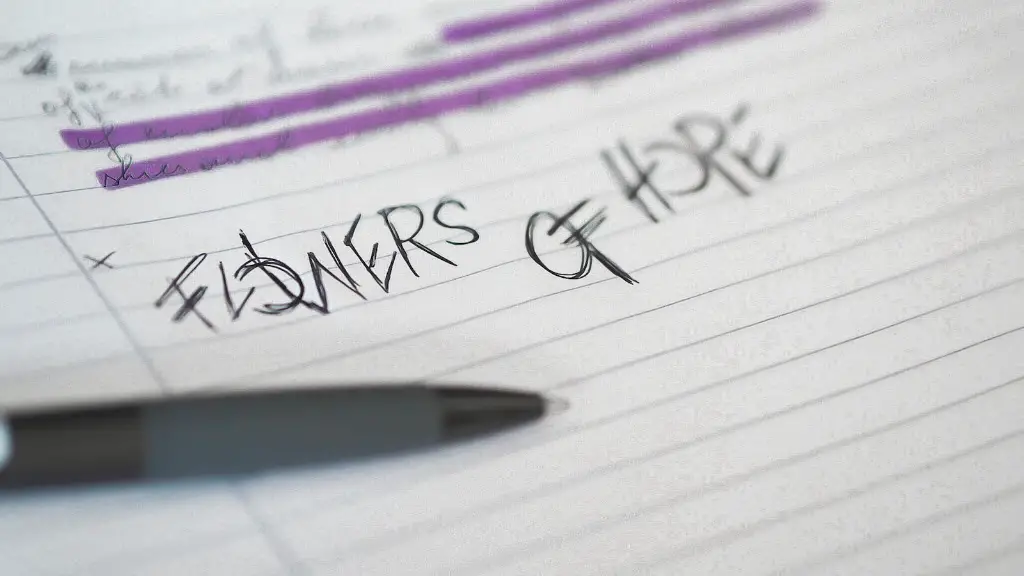The dawn of the 21st century has brought with it a plethora of advanced technologies, applications and many more. As a result, literary works have been pushed to the forefront. Poetry is a type of literature that has been embraced by many and stands to offer a powerful platform for creativity and self-expression. Poetry has the power to tell stories, invoke feelings, and provide a nuanced view on matters of the past, present and future.
As John Donne famously said, “No man is an island”. Poetry aids in creating a sense of connection and belonging amongst individuals across the globe. Words provide a beautiful means of communication—spoken, written or even implied. Through poetry, we can explore experiences, culture and a variety of life experiences through what the poem itself implies. Poets have the unique ability to condense deep and meaningful ideas and thoughts into a single, powerful line—allowing almost anyone to understand and interpret the poem in whatever way applies to them. This facilitates a sense of identity and meaningful understanding of ourselves and the experiences we have.
Poetry has an interesting cross-cultural appeal. Many poets can draw upon an array of linguistic elements, combining diverse sources from all over the world. By gaining perspectives from multiple cultures and languages, poets have the ability to present a more substantiated and unique viewpoint. For example, the poetry of William Shakespeare during the 16th and 17th centuries is still read and celebrated as it offers a vast amount of cultural insight into what life was like during that period.
In the modern era, poetry can help bridge the gaps created by a language barrier. A single poem can translate into a multitude of languages simply by altering the words or syntax. This allows readers to understand the poem in practically any language, be it in English, French, Mandarin, or any other. By understanding the fundamentals of a poem, anyone can relate to it regardless of their native language. Making poetry accessible to all allows us to appreciate the beauty of the poem and broaden our understanding beyond the surface level of words.
The themes expressed in poems also offer an opportunity for readers to delve into ideas and experiment with developing their own stance. Many poets have tackled difficult and current topics that surround the notions of love, race, and politics. By engaging in poets’ works, readers can contemplate and form independent opinions—not only about the poetic elements, but also about the issues being discussed within the poem itself. In doing so, this type of reflective thinking builds a more holistic understanding.
To understand the power of a poem and its use as a source of comfort or philosophy, one must remember to view it with an open perspective—considered in the cultural context in which it was written. This is key in understanding the beauty and creativity of words.
Importance of Poetry in Global Context
The importance of poetry goes beyond language, age and nationality. In fact, the relevance of poetry is one of the strongest components that unites us as a global society. Poetry gives a voice to the voiceless and often showcases unheard perspectives. On a larger scale, it challenges the status-quo and intellect of the powers-that-be—holding them to account for their decisions. In moments when global challenges seem especially acute, poetry has been seen as a way to question, protest and combat the difficulties of today.
Apart from exploring topics that transcend cultures, poetry can also be used in conjunction with other forms of human expression such as music, art, and drama. For instance, music and poetry are especially connected in that they both rely on a strong creative use of words and rhythm. This can create an immersive and powerful piece of art—immortalizing it beyond generations.
Influence of Poetry in Educational Development
In addition to global influence, poetry can also be used to stimulate imagination, promote critical thinking and aid in the development of language and communication skills. By familiarizing students with the medium of poetry and its numerous forms, the confidence to express opinions and ideas in a more articulate manner is established. This enhances the drive for greater creativity and exploration, leading to increased engagement with the learning material provided.
In addition, poetry can be used to raise awareness and recognize important social issues. By engaging with poetic forms, students are able to recognize the importance of free speech and the creative expression of ideas. This type of thinking promotes the values of open-mindedness and understanding in the classroom community and encourages the embracing of people’s individual perspectives.
Benefits of Poetry
Poetry is a source of emotional nourishment and can push us towards personal and emotional growth. Time and again, people have turned towards poetry to seek solace. The flexibility of this form of literature prevents stagnation and facilitates cognitive development. It helps us to tone down emotional reactions and come to terms with opposing viewpoints. As emotions are explored more deeply, we gain an enriched understanding of the world and those within it.
Positive outcomes for the individual can be translated to impacts on the collective. Many communities—large and small—benefit from the universal appeal of poetry. Beyond the informative aspect of poetry, it also holds cultural relevance. By embracing the poetic arts, we gain further insight into who we are as individuals and what our identity means within the larger context of society.
Power of Poetry Inwardly
Poetry can offer a tool for connecting inwardly and seeking comfort. During difficult times, we look for answers, and poetry provides us with the opportunity to reflect and gain understanding, a way of making sense of the feelings and thoughts that may be too complex to articulate. This type of self-reflection and understanding can help lead to inner-peace and healing. In essence, the beauty lies in enabling us to find our own truths and personal truths.
Art has, and always will be, eloquent. Its timeless ability to transcend language and cultural barriers is what makes poetry so impactful and important today. Its relevance is reflected within history and its use as a tool for personal enlightenment and societal changes alike. As a literary form, poetry offers an important platform to explore creative narrations and personal expression. It engenders an appreciation for words and a greater understanding of ourselves. In a world seemingly divided, poetry brings us together by creating a connection between our minds and hearts.
Role of Poetry in Human Empowerment
Poetry is particularly relevant when it comes to the notion of human empowerment. In the past, poets have traditionally been seen as activists of social justice, giving space and a voice to those who have been oppressed and marginalized. Poetry has been used to inspire movements and to offer hope to those who lack it. Today, the power of poetry is being adapted and utilized for human rights, gender rights, and environmental justice, and more.
Poetry seems to have the power to break the cycle of oppression and injustice. In establishing a safe space for expression, poetry can redefine the way people think and speak. Through poetry, marginalized and underrepresented groups can create a unique personhood—guiding others to recognize their worth and advocating for their rights. This distinguishes the power of poetry from other forms of literature; a greater role can be played in the pursuit of individual emancipation and collective progress.
Combating Global Issues Through Poetry
Now more than ever, poetry has the potential to tackle major global issues. COVID-19 is one prime example. The majority of individuals around the world have been directly affected by the pandemic, be it personally or indirectly. Poets everywhere have responded to this call to action in many different ways—offering comfort, great insight, and the ability to provide a sense of hope and assurance in times of distress.
Terrorism is another global issue that is ripe for social commentary through the medium of poetry. Terrorist activities are a direct threat to the future of global peace and security. Poems have the potential to break stereotypes, identify prejudices, and challenge the assumptions made about certain regions or populations. They open up room for discussions and thoughtful insight. In doing so, they can offer constructive criticism and equally balanced conversations, while aiding in the broadening of public discourse.
Having endured decades of economic and political upheaval, people in both developing and developed countries have looked to poetry for understanding. In acknowledgement of this reality, the United Nations established April 21st to be International Poetry Day—changing the way we view and understand the world. Through their work, the effectiveness of the poetic form can unite diverse cultures and can challenge established attitudes.




